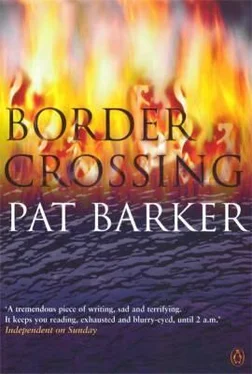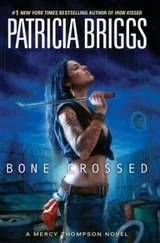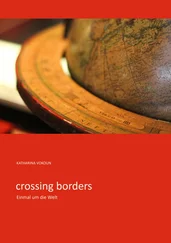But they persevered. They got the photograph album out as soon as they could bear to, and laughed and cried over old memories, guiding themselves gently past the last photographs of him in the chair, reminiscing about family holidays, the dogs they’d kept when Tom was a child.
A year after his father’s death she still, occasionally, laid the table for two.
On the first anniversary she went to the local RSPCA refuge and adopted Tyger, a three-year-old tabby whose previous owner had died. The owner’s other four cats had been rehomed without difficulty, but Tyger grieved ceaselessly, irreconcilably, turning his back — literally — on anybody who tried to make friends. In the end he’d been placed in a carer’s home, where he took up residence inside a doll’s house, glaring through its latticed windows, coming out only to eat and use his tray. ‘That’s the one,’ his mother said. ‘Come on, Tyger. Let’s go and be miserable together.’ Stage four of grieving: the transference of libido to another object, person or activity. Tom’s mother made more rapid progress with this than Tyger, who, for the first three months, retreated behind the sofa, and spat.
The natural love object, the one that would have contributed enormously to her recovery, was a grandchild, but that he was, rather conspicuously, failing to supply. ‘How’s Lauren?’ she asked.
‘Fine. Fine. She seems to be enjoying herself.’
‘Coming home this weekend?’
‘No, she’s going to see her parents. It’s their fortieth wedding anniversary soon, so they’re all planning the party.’
‘You should go with her, Tom.’
‘I’m not invited.’
‘Oh.’ She swished her drink round the bottom of the glass, not looking at him. ‘It’s not good, is it?’
‘Everybody has bad patches, Mum.’
She nodded her acceptance. ‘Come on, let’s eat.’
The meal passed in gentle, inconsequential chat. Jeff Bridges, his best friend from primary-school days, was getting a divorce. ‘He was always trouble, that one,’ Tom’s mother said, rather harshly he thought. Marriage wasn’t easy, and Jeff had embarked on it far too young. Home from university for the first long vacation, he’d met Jeff pushing his eldest daughter in her pram. Tom had felt like a schoolboy, still, in comparison with Jeff, though he’d had sense enough not to envy him.
Just as they were finishing lunch, a sudden squall of rain blew up. Shadows of black clouds, chasing each other up the hill, dowsed the gorse. Tom dashed out to lower the parasol, wrestling with its damp folds, feeling drops of rain patter on to his back through the thin shirt. The slap of wet cloth against his face exhilarated him, and he went back into the house, glowing.
As soon as they finished their coffee, he said, ‘I think I should be getting back.’
They embraced on the doorstep, but his mother was the one who broke the embrace first. A scrupulously honourable woman, she would never, for a second, leech off her son’s life, or use him in any way as a substitute for his father. ‘Ring when you get back,’ was all she said.
Danny Miller had been at the back of his mind all day, and he wanted, before setting off home, to revisit a place he had played in as a child. It was only a few miles away, a slight detour off the main road. He pulled on to the grass verge, and set off to walk the rest of the way.
The path to the pond seemed less clear, less well trodden, than when he was a boy, and he and Jeff Bridges came here to play. The recent heavy rain had turned dips into quagmires. He edged past them, shuffling sideways along the steep verge, hawthorn twigs snagging on his shirt. Pushing down the green tunnel, he seemed to be going back into the past. He wouldn’t have been surprised to meet his ten-year-old self coming in the other direction, holding a jam jar, the murky water thick with tiddlers or tadpoles. Or spawn.
They’d been looking for spawn that day. He and Jeff had wanted to go off by themselves, but instead they’d been saddled with Neil, the four-year-old son of some friends of Jeff’s parents who’d turned up for the weekend and wanted to go for a drink in a pub that didn’t take children. ‘The boys can play together,’ Jeff’s father had said easily, ignoring Jeff’s muttered, ‘Da-ad, do we have to?’
They were told to stay in the garden. They did, for about twenty minutes, playing piggy in the middle. Neil had to be the piggy because he couldn’t throw the ball. They sent it high above his head, getting a sour pleasure from his increasing bewilderment as he ran to and fro. Then, bored, they decided on a quick visit to the pond, got their jam jars and set off, dragging Neil after them. He was a polite, solemn little boy, with dark-rimmed glasses and an anxious expression. Grown-ups thought Neil was cute, kids thought he came from another planet. He trotted along with his mouth open, breathing noisily through his nose because he’d been told not to breathe through his mouth, and Neil always did what he was told. ‘We’re going to get frog spawn, Neil,’Jeff said, in the spuriously excited, isn’t-this-fun tone of voice he’d heard used by adults (mainly adults who didn’t like children very much).
Wellies, that day. It wasn’t raining, but in spring all the paths were deep in mud. Once they’d got to the pond they saw that the frog spawn — newly laid, standing proud above the water — was five or six feet away from the bank. Too deep for wellies, so they pulled them off and stood on the edge of the pond, barefoot, cold goose shit oozing up between their toes. Neil prattled away, poking at the sandy bank with a stick, ignored by both of them.
The pond was on a farmer’s land, though not visible from the farmhouse. You weren’t supposed to play there, because the pond wasn’t a proper pond at all, but a flooded well. Out there, in the clear centre, where no weeds grew, there was a drop of a hundred feet.
Thirty years later, standing on the edge of the same pond, Tom wondered if that were true. It sounded like the kind of story adults might tell to frighten the children away, but he couldn’t be sure. They’d waded out up to their waists once, daring each other to go further, but then Jeff stubbed his toe on a stone, and, panicking, they’d splashed back into the shallows. Behind the fringe of willow trees on the far bank was a road, quiet, since the building of the bypass five years ago, but then, busy, cars, buses and lorries roaring past.
No geese today. Then, they’d honked and hissed and swayed off, to stand at a slight distance, malevolent and watchful, as Tom started to wade into the pond. His feet raised clouds of fine mud. Frogs kicked away into the weeds, tiny males clinging to the fat females, even in the emergency of this invasion unable to let go. They dived into the mud and reappeared further out, croaking mournfully, their eyes like blackcurrants breaking the surface.
New spawn, the jelly still firm with tadpoles like full stops. Old spawn, slack jelly, tadpoles like commas. Tom lowered the jam jar beneath the surface, easing mounds of silvery slobber over the rim. Some of it was too firm to flow; he had to pull it apart to get it in. When he’d got enough, he turned round and saw Jeff, scooping spawn into his own jar, and behind him, wobbling precariously, still wearing his wellies, Neil.
It started as a joke. A cruel joke, yes, but still a joke. Whose idea was it to put frog spawn into Neil’s wellies? He couldn’t remember. Jeff’s, he thought, but then he needed to think that.
Neil screamed as the heavy jelly slopped over the tops of his boots and filled them to the brim, pressing in on his bare legs. He wasn’t hurt, he just couldn’t bear the cold slime on his skin. He screamed and screamed, jumped up and down, fell over, got up again, soaked, face smeared with snot, piss coursing down his legs. There was no way out. The more he screamed, the more they panicked. They couldn’t take him home like this, and they couldn’t clean him up. Jeff scrambled on to the bank, Tom followed, but Neil couldn’t move. They shouted at him to get out, but when he tried to move the spawn shifted and squelched inside his wellies, and he screamed again.
Читать дальше












